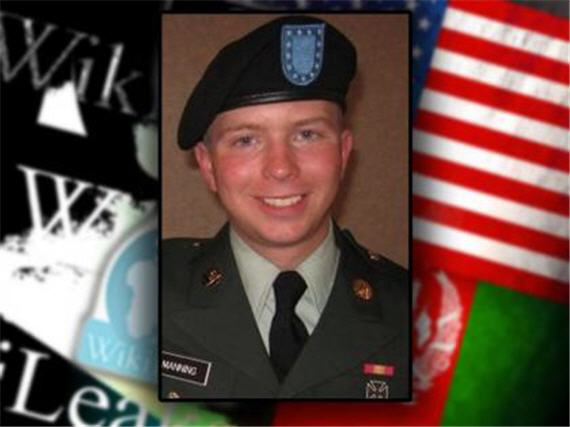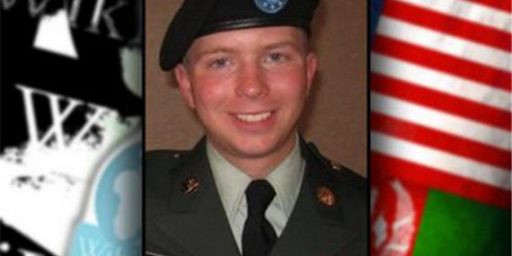Bradley Manning Pleads Guilty
Bradley Manning has pleaded guilty to 10 charges stemming from turning classified documents over to WikiLeaks.
Bradley Manning has pleaded guilty to 10 charges stemming from turning classified documents over to WikiLeaks.
NYT (“Army Private Admits Giving Trove of Military Data to WikiLeaks“):
Pfc. Bradley Manning on Thursday confessed in open court to providing vast archives of military and diplomatic files to the antisecrecy group WikiLeaks, saying that he wanted the information to become public “to make the world a better place.”
Appearing before a military judge for more than an hour, Private Manning read a statement recounting how he joined the military, became an intelligence analyst in Iraq, decided that certain documents should become known to the American public to prompt a wider debate about the Iraq war, and ultimately uploaded them to WikiLeaks.
“No one associated with WLO” — an abbreviation he used to refer to the WikiLeaks organization — “pressured me into sending any more information,” Private Manning said. “I take full responsibility.”
Before reading the statement, Private Manning pleaded guilty to 10 criminal counts in connection with the huge leak, which included videos of airstrikes in Iraq and Afghanistan in which civilians were killed, logs of military incident reports, assessment files of detainees held at Guantánamo Bay, Cuba, and a quarter-million diplomatic cables.
The guilty pleas exposed him to up to 20 years in prison. But the case against the slightly built, bespectacled 25-year-old — who has become a folk hero among antiwar and whistle-blower advocacy groups — is not over.
The military has charged him with a far more serious set of offenses, including aiding the enemy and multiple counts of violating the Espionage Act, and prosecutors now have the option of pressing forward with proving the remaining elements of the more serious charges.
That would involve focusing only on questions like whether the information he provided counted as the sort covered by the Espionage Act — that is, whether it is “national defense information” that could be used to injure the United States or aid a foreign nation.
In a riveting personal history, Private Manning portrayed himself as thinking carefully about the categories of information he was divulging, excluding the sort that would harm the United States. He said he was initially concerned about diplomatic cables in particular, but after doing research learned that the most sensitive ones were not placed into the database to which he had access, and concluded that those might prove “embarrassing” but would not cause harm.
There is zero doubt in my mind that the United States vastly overclassifies information and that it sometimes does so for reasons unrelated to the national security. I am equally sure that the solution to these problems is not to make every private soldier into a declassification authority.






They broke him. He pled guilty to end the torture they put him through.
@Christopher Bowen: I’ve written quite a bit about the horrendous confinement conditions to which Manning was subjected. But there was never any doubt that he’d done what he was charged with doing. Nor do I think Manning ever disputed this.
I thought it was obvious and well-known from the gitgo that Manning was guilty. That’s not really the point of all the arguing that’s gone on.
Note that he has plead not guilty to 12 other charges.
@Christopher Bowen:
They broke him. He pled guilty to end the torture they put him through.
Regardless of his treatment in custody, he pled guilty to crimes he clearly committed.
I am equally sure that the solution to these problems is not to make every private soldier into a declassification authority.
Manning didn’t release the cables because classification is a problem. He released them because of what he observed in Iraq. He wanted to expose, to hit back, to show what he thought was going on. And he was right.
Consider:
What Manning was naive enough to believe was that shame and justice are concepts that Americans are really into.
Give him probation and time served. Enough with this.
Well now that that horrible controversy is over perhaps James you can look into who is turning off the microphones at Khalid’s Gitmo trial?
@michael reynolds:
I sincerely hope thats what happens. The kid is obviously guilty, but at this point, it looks like theyre just trying to make an example out of him. The whole episode is pretty disgusting.
@michael reynolds: That plus 20 years seems right to me.
@michael reynolds: Some traitor love from the lunatic left.